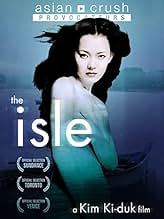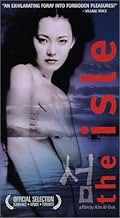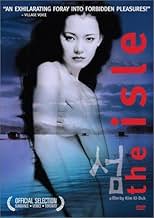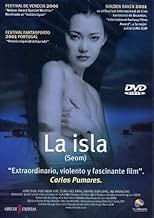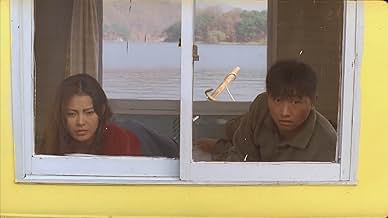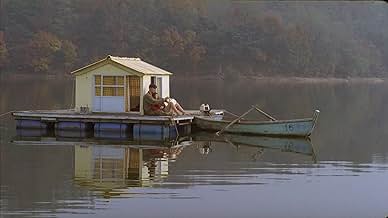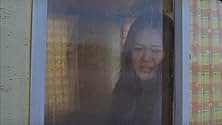AVALIAÇÃO DA IMDb
6,9/10
15 mil
SUA AVALIAÇÃO
Trabalhando em um centro de pesca em um local idílico, mas rodeada por várias facetas de agitação humana, uma jovem se apaixona por um homem que está fugindo da lei por cometer um assassinat... Ler tudoTrabalhando em um centro de pesca em um local idílico, mas rodeada por várias facetas de agitação humana, uma jovem se apaixona por um homem que está fugindo da lei por cometer um assassinato.Trabalhando em um centro de pesca em um local idílico, mas rodeada por várias facetas de agitação humana, uma jovem se apaixona por um homem que está fugindo da lei por cometer um assassinato.
- Direção
- Roteirista
- Artistas
- Prêmios
- 6 vitórias e 7 indicações no total
Avaliações em destaque
Wow, where to start with this. Ki Duk Kim has always been a divisive director, with his films showing slow burning, very natural, almost spiritual human traits. This though is like a magnified version of a Ki Duk Kim film. It's low budget, set in a single location, stunningly beautiful, very gruesome in parts, explicit and controversial. It centres around a lonely woman (Hee Jin) who delivers bait to tourist fisherman. What we see unfold is a symbolism heavy ride into a twisted / tumultuous relationship between Hee Jin and a visitor. It's full of breathtaking cinematography, sparse dialogue and one of the most stomach churning suicide attempts I've ever seen on screen. As usual with Ki Duk Kim, water as a symbol is featured heavily, and so are animals and nature. Quite why certain little creatures are sacrificed on screen I'm not sure though. A warning to anyone who is easily offended by animal cruelty - don't watch this movie.
What does it all mean in the end? I'm torn between it being an entire metaphor for how difficult relationships can be / an exploration into gender roles or a simple descent into madness tale. Maybe all 3. It is a heck of an experience though. Think of a Pedro Almodóvar movie mixed with a bit of Takashi Miike, maybe with a bit of Haneke in there too, and you may get the picture.
It's beautiful yet gruesome. I have to take a mark off for the animal cruelty, as it is bordering on unacceptable levels at times, but it still gets a 7.5/10
What does it all mean in the end? I'm torn between it being an entire metaphor for how difficult relationships can be / an exploration into gender roles or a simple descent into madness tale. Maybe all 3. It is a heck of an experience though. Think of a Pedro Almodóvar movie mixed with a bit of Takashi Miike, maybe with a bit of Haneke in there too, and you may get the picture.
It's beautiful yet gruesome. I have to take a mark off for the animal cruelty, as it is bordering on unacceptable levels at times, but it still gets a 7.5/10
Another movie that has attained a little notoriety from the number of walk-outs at festival screenings, and even a couple of audience members passing out. Whilst it is not hard to see why, it is a shame that is what the film is known for, as there is much more to it than *those* scenes. A mute girl makes a living running a kind of retreat, where men can rent a floating cabin on a lake in the mountains and spend their days fishing, and their nights sleeping with prostitutes. The mute girl makes ends meet by taking on this role as well. A young man arrives and rents a cabin, clearly not their for the fish. We see that he is tortured and suicidal - you wouldn't guess why from the 5 second flashback that is meant to explain it, but the 'filmography' section of the DVD explains it in more detail. The mute girl is drawn to the man's desperation, perhaps feeling sympathy/protectiveness, or perhaps simply relating to another deeply unhappy soul.
The relationship between these two characters, and several other characters that come to the lake for one reason or another, is the main focus of the film. The difficulty some people have with relationships is the topic being studied, particularly when they are not happy in their relationship with themselves. The inner feelings of the characters receive expression in scenes whose 'shock factor' has drawn inevitable comparisons with Takashi Miike, especially AUDITION. Director Kim Ki Duk doesn't seem to mind these comparisons:
"KK: I saw Audition at Toronto and that movie made me realize that there is someone else out there like me. We are two of a kind"
If you couldn't sit through the last half hour of AUDITION, you'll probably want to give THE ISLE a miss too. It's also definitely not a film for animal lovers... there is absolutely zero chance of the film being released intact in the UK or the US, as the treatment of the animals in the film (mainly fish) is far outside what is permissible in either country's regulations.
But there is much more to THE ISLE than the scenes that make keeping your eyes on screen a challenge. In between, the film is absolutely ravishing, and will keep your eyes glued there. The setting of the lake, mostly bathed in deep fog, and the fantastic wordless performance from actress Jung Suh (and the rest of the cast) are beautiful and powerful. The loneliness and sadness of the characters is reflected brilliantly in the total isolation of the floating cabins. There is a deep message in the film, and it is presented to us beautifully.
Like Miike, Kim Ki-Duk makes us work for our reward when we watch THE ISLE... if you want to take away the beauty of his film, you have to be willing to pay the price of the horror. Thoroughly recommended!
One note: the film is another one of those great films that just doesn't know how to end itself. Actually, we get the perfect ending... a nice long shot and a fade to white and it should have been over, but
apparently Kim Ki Duk wasn't quite satisfied to leave it at that and tacks on two extra scenes, about a minute of footage, that are simply inexplicable and serve only to confuse and spoil the mood. My recommendation... when it fades to white, simply stop the DVD
The relationship between these two characters, and several other characters that come to the lake for one reason or another, is the main focus of the film. The difficulty some people have with relationships is the topic being studied, particularly when they are not happy in their relationship with themselves. The inner feelings of the characters receive expression in scenes whose 'shock factor' has drawn inevitable comparisons with Takashi Miike, especially AUDITION. Director Kim Ki Duk doesn't seem to mind these comparisons:
"KK: I saw Audition at Toronto and that movie made me realize that there is someone else out there like me. We are two of a kind"
If you couldn't sit through the last half hour of AUDITION, you'll probably want to give THE ISLE a miss too. It's also definitely not a film for animal lovers... there is absolutely zero chance of the film being released intact in the UK or the US, as the treatment of the animals in the film (mainly fish) is far outside what is permissible in either country's regulations.
But there is much more to THE ISLE than the scenes that make keeping your eyes on screen a challenge. In between, the film is absolutely ravishing, and will keep your eyes glued there. The setting of the lake, mostly bathed in deep fog, and the fantastic wordless performance from actress Jung Suh (and the rest of the cast) are beautiful and powerful. The loneliness and sadness of the characters is reflected brilliantly in the total isolation of the floating cabins. There is a deep message in the film, and it is presented to us beautifully.
Like Miike, Kim Ki-Duk makes us work for our reward when we watch THE ISLE... if you want to take away the beauty of his film, you have to be willing to pay the price of the horror. Thoroughly recommended!
One note: the film is another one of those great films that just doesn't know how to end itself. Actually, we get the perfect ending... a nice long shot and a fade to white and it should have been over, but
apparently Kim Ki Duk wasn't quite satisfied to leave it at that and tacks on two extra scenes, about a minute of footage, that are simply inexplicable and serve only to confuse and spoil the mood. My recommendation... when it fades to white, simply stop the DVD
The film gives you that heavy, unexplainable, load after watching. There's not much child-friendly scenes going on, and that's what made me love this. There's cruelty and profanity everywhere, with the injection of, on its face, irrelevant scenes which were either intentionally placed to stir our brains, or were unintentionally left by a director who lacked ideas. I have to believe its the former.
The Isle actually made me laugh, because the scenes were just so explicit, overt and straightforward that I can't help but be amazed at Kim's confidence. I honestly can't believe he had the guts to do all those stuff. He takes the risk to employ moral and social taboos in his films and that's what I like about him. He doesn't hold back just to please everyone.
The story isn't messy, too. There's room for interpretations but the movie still gave away its own essence. Actually, if you were to summarize the story, you can do it in a sentence or two. What made the movie complex is Kim's approach. I think he failed on his approach in 3-iron but he was successful this time. Perhaps because he coursed through the more understandable route--hit what you wan't to say in your movie without lingering, but do it painfully straight to scar the viewer--that's what he did! I think any social and moral controversy you can think of can be found in this movie..rape, prostitution, poverty, animal cruelty, torture, lust, murder, name it. It's all here.
I can totally understand how some scenes probably scared and scarred a lot of viewers. And I can totally understand how some might view him as a provocateur. I, on the other hand, believe otherwise. The movie might not be accommodating to those who have weak stomachs, but there lies the beauty of this film.
The Isle won't bore you, because its either the explicit sex scenes will hold your attention, or the previous metal-eating, vomit-inducing, scene still consumes your thoughts. This for me, is a timeless masterpiece.
The Isle actually made me laugh, because the scenes were just so explicit, overt and straightforward that I can't help but be amazed at Kim's confidence. I honestly can't believe he had the guts to do all those stuff. He takes the risk to employ moral and social taboos in his films and that's what I like about him. He doesn't hold back just to please everyone.
The story isn't messy, too. There's room for interpretations but the movie still gave away its own essence. Actually, if you were to summarize the story, you can do it in a sentence or two. What made the movie complex is Kim's approach. I think he failed on his approach in 3-iron but he was successful this time. Perhaps because he coursed through the more understandable route--hit what you wan't to say in your movie without lingering, but do it painfully straight to scar the viewer--that's what he did! I think any social and moral controversy you can think of can be found in this movie..rape, prostitution, poverty, animal cruelty, torture, lust, murder, name it. It's all here.
I can totally understand how some scenes probably scared and scarred a lot of viewers. And I can totally understand how some might view him as a provocateur. I, on the other hand, believe otherwise. The movie might not be accommodating to those who have weak stomachs, but there lies the beauty of this film.
The Isle won't bore you, because its either the explicit sex scenes will hold your attention, or the previous metal-eating, vomit-inducing, scene still consumes your thoughts. This for me, is a timeless masterpiece.
Seom aka The Isle is written and directed by Korean film maker Ki-duk Kim. This bizarre film tells about happenings in strange fishing resort in which fishermen live and fish in floating cabins at daytime, and have fun and sex with local prostitutes at night time. The film's protagonist is an attractive, but very mysterious female (Suh Jung) who never talks, and works as some kind of "boat girl" who gets the food and prostitutes for the fishermen and other similar activities with her little boat. There is minimal amount of dialogue in The Isle, and it is hard to describe this ultra bizarre film after just one viewing.
The visuals are very astonishing and stunning as the settings are so atmospheric and natural. The calm mist and smoke above the water is very moody and even surreal, and this all is intensified even further by great use of camera, occasionally very weird angles and total feel of peace and magic. Blue is the main color in the film, and it is equally brilliant-looking as in many Hong Kong thrillers like Dr. Lamb by Danny Lee and Red to Kill by Billy Tang. The colors are always fantastic in Asian films, and The Isle once again proves and shows this. This film is a delight to the eye..at least before the infamous scenes involving fishing hooks.
The director has said that he wanted to depict relationships between men and women with this film, and that the film tells something about how dependent were are on each other, and especially on another sex. Once the first horrific "hook scene" comes, the only cure for his pain is the main female, who by giving him carnal pleasure, takes away or diminishes his pain - and vice versa later in the film. I think that this film is more feminist since the very surreal closing scene is so underlining as the man finally finds the "truth" and source of all life. Another reviewer thought that the end scene is gratuitous and only there to confuse things even further, and that may be the case, but still I want to interpret it as above, and it is very personal scene in depicting that eternal truth. Seeing is believing...
I think there's lot more than just this in the core of The Isle. The film really tells something about the relationship between humans and nature and nature's sources. There are many scenes depicting man exploiting nature and its inhabitants, and I think that the forthcoming scenes of mutilation are also symbolic as things turn upside down: humans become the victims of what they have practised and see the results. At this point, it is necessary to stress that there are many scenes of actual killing and off putting abuse of animals (mainly fish) which I, also, think are gratuitous since the message of the film is pretty hard to take since the film does the same exploitations it depicts committed by its characters. Then again, the killings show the real face of our world, since in order to stay alive, we have to use nature's resources and there's nothing wrong in that. So what's wrong in my opinion is that the animals in The Isle are not killed without pain and suffering, and that is not right nor human since I think that no living creature should die painfully or tortured. I wanted to think that the animals were not mutilated and killed in the film for real, but it all looks sadly too real. Still, I have to find the film's merits even though it becomes far more difficult when I remember these "animal snuff" scenes, that are unnecessarily explicit, albeit meant to be symbolic, which they of course are, if one can still accept this after the horrific imagery.
This film reminded me pretty much of Japanese film Naked Blood, which also is very beautiful and surreal film, but soon the horrific scenes of self mutilation and ultra splatter are on screen before the viewer's eyes. The self mutilations committed by fish hooks in The Isle are very gruelling to say the least, so this film will make the weakest viewers faint, as many festival screenings have proven. They are so sickeningly effective I wanted to stop thinking about what it would feel like to actually do something like that. Fish hooks are very small, but like Stuart Gordon has said (about the finger biting moment in Re-Animator), the smallest things may be the most horrific in many cases. These fish hooks really are symbolic as the humans are "turned to fishes" and get to see what they've done and created.
The Isle is very weird, bizarre, calm and also disturbing piece of cinema, and only minority of cinema lovers will stomach and appreciate films like The Isle. As I stressed earlier, I am sorry about the fact of animal mutilation presented in the film, and without those scenes, I would probably give more stars in the rating. Now it gets little less even if I wanted to give it more as a piece of art. 8/10 and to understand more about this film, it has to be seen many times since it unfolds pretty slowly.
The visuals are very astonishing and stunning as the settings are so atmospheric and natural. The calm mist and smoke above the water is very moody and even surreal, and this all is intensified even further by great use of camera, occasionally very weird angles and total feel of peace and magic. Blue is the main color in the film, and it is equally brilliant-looking as in many Hong Kong thrillers like Dr. Lamb by Danny Lee and Red to Kill by Billy Tang. The colors are always fantastic in Asian films, and The Isle once again proves and shows this. This film is a delight to the eye..at least before the infamous scenes involving fishing hooks.
The director has said that he wanted to depict relationships between men and women with this film, and that the film tells something about how dependent were are on each other, and especially on another sex. Once the first horrific "hook scene" comes, the only cure for his pain is the main female, who by giving him carnal pleasure, takes away or diminishes his pain - and vice versa later in the film. I think that this film is more feminist since the very surreal closing scene is so underlining as the man finally finds the "truth" and source of all life. Another reviewer thought that the end scene is gratuitous and only there to confuse things even further, and that may be the case, but still I want to interpret it as above, and it is very personal scene in depicting that eternal truth. Seeing is believing...
I think there's lot more than just this in the core of The Isle. The film really tells something about the relationship between humans and nature and nature's sources. There are many scenes depicting man exploiting nature and its inhabitants, and I think that the forthcoming scenes of mutilation are also symbolic as things turn upside down: humans become the victims of what they have practised and see the results. At this point, it is necessary to stress that there are many scenes of actual killing and off putting abuse of animals (mainly fish) which I, also, think are gratuitous since the message of the film is pretty hard to take since the film does the same exploitations it depicts committed by its characters. Then again, the killings show the real face of our world, since in order to stay alive, we have to use nature's resources and there's nothing wrong in that. So what's wrong in my opinion is that the animals in The Isle are not killed without pain and suffering, and that is not right nor human since I think that no living creature should die painfully or tortured. I wanted to think that the animals were not mutilated and killed in the film for real, but it all looks sadly too real. Still, I have to find the film's merits even though it becomes far more difficult when I remember these "animal snuff" scenes, that are unnecessarily explicit, albeit meant to be symbolic, which they of course are, if one can still accept this after the horrific imagery.
This film reminded me pretty much of Japanese film Naked Blood, which also is very beautiful and surreal film, but soon the horrific scenes of self mutilation and ultra splatter are on screen before the viewer's eyes. The self mutilations committed by fish hooks in The Isle are very gruelling to say the least, so this film will make the weakest viewers faint, as many festival screenings have proven. They are so sickeningly effective I wanted to stop thinking about what it would feel like to actually do something like that. Fish hooks are very small, but like Stuart Gordon has said (about the finger biting moment in Re-Animator), the smallest things may be the most horrific in many cases. These fish hooks really are symbolic as the humans are "turned to fishes" and get to see what they've done and created.
The Isle is very weird, bizarre, calm and also disturbing piece of cinema, and only minority of cinema lovers will stomach and appreciate films like The Isle. As I stressed earlier, I am sorry about the fact of animal mutilation presented in the film, and without those scenes, I would probably give more stars in the rating. Now it gets little less even if I wanted to give it more as a piece of art. 8/10 and to understand more about this film, it has to be seen many times since it unfolds pretty slowly.
Ki-duk Kim's "Seom"/"The Isle" has to be one of the most beautiful movies I have ever seen.The cinematography,the silence and the themes under the surface are incredible.The film explores human relationships and the pain of being in love,and being loved.Both characters(Hyun-shik and Hin-jin)are lost human beings searching for love.They crave love,yet shun it when it comes to them,as they are deeply aware of the destructive qualities it brings out in them.Suh-Shik Hwang's cinematography is absolutely beautiful and captures many impressive visuals.Still there are some horrific images that will shock casual viewer,so the viewer should be prepared.9 out of 10.
Você sabia?
- CuriosidadesThis fell foul of the British Board of Film Classification who demanded cuts, not because of the scene where a metal object is inserted into a vagina but of cruelty to fish, which director Kim Ki-duk admitted was genuine.
- Versões alternativasThe cut UK print was submitted to the Irish censor who cited the violence as causing concern - he gave the distributor (Tartan Films) two options:
- Resubmit the same version (presumably for an appeal/reconsideration)
- Submit an altered version to secure a certificate
- ConexõesReferenced in Primavera, Verão, Outono, Inverno... e Primavera (2003)
Principais escolhas
Faça login para avaliar e ver a lista de recomendações personalizadas
- How long is The Isle?Fornecido pela Alexa
Detalhes
Bilheteria
- Orçamento
- US$ 1.000.000 (estimativa)
- Faturamento bruto nos EUA e Canadá
- US$ 20.666
- Fim de semana de estreia nos EUA e Canadá
- US$ 4.546
- 25 de ago. de 2002
- Faturamento bruto mundial
- US$ 24.963
- Tempo de duração1 hora 30 minutos
- Cor
- Mixagem de som
- Proporção
- 1.85 : 1
Contribua para esta página
Sugerir uma alteração ou adicionar conteúdo ausente




